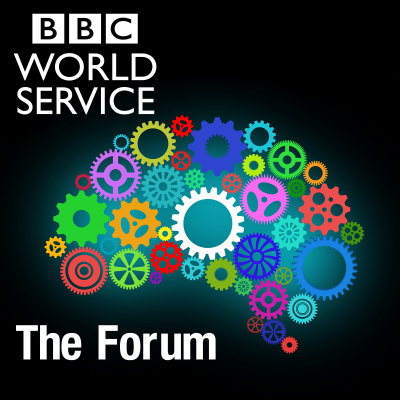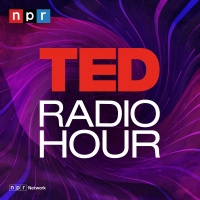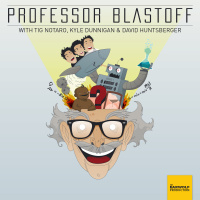Sinopse
A world of ideas
Episódios
-
A history of honey
16/01/2020 Duração: 39minIt takes twelve honey bees their entire lifetimes to make one spoonful of honey. From sweetening and preserving food, to treating wounds and sore throats, this sweet, viscous substance has played an important role in nearly every society around the world. In the ancient world, it held religious significance while in the 21st century, scientists are researching how honey could combat lethal diseases and finding ways to identify so-called fake honey.Joining Rajan Datar to discuss the history of honey are Dr Lucy Long - author of Honey: A Global History and director of the nonprofit Center for Food and Culture in Ohio, USA; Sarah Wyndham-Lewis - writer, Honey Sommelier and co-founder of Bermondsey Street Bees in London, UK; and the Australian microbiologist Dr Shona Blair from Imperial College London who has conducted detailed research into the antimicrobial activity and wound healing properties of honey.Photo: A Yemeni beekeeper checks a honeycomb from a beehive at his apiary in the country's northern Hajjah pr
-
Highlife: The sound of Ghana
09/01/2020 Duração: 39minThe name Highlife is thought to have been coined in the early 20th Century when people on the streets outside clubs reserved for the Gold Coast elite observed the elegant clothes and dancing of the customers inside. Dance band Highlife is just one element of the music which has soaked up all manner of cultural traffic that has marked this part of West Africa. Military bands, gospel, calypso, folk music, ragtime, jazz, reggae, hip hop have all left their imprint on Highlife in a dizzying back-and-forth between Africa and the New World. When the Gold Coast became the independent state of Ghana in 1957, the music became associated with the search for a national identity. Ghana's first president, Kwame Nkrumah, made Highlife the national dance music, a move that was copied by other emerging nations of West Africa. But from its heyday in the 1960s and '70s, Highlife fell on hard times when a military regime came to power and imposed a curfew. Many musicians left the country to pursue their careers elsewhere. But
-
Yiddish: A story of survival
02/01/2020 Duração: 40minAt its height, Yiddish, the language of the European Jews, was spoken by more than ten million people, from Russia in the east to the Netherlands in the West. But by the mid -20th century, these numbers were severely depleted following the Holocaust, and then the creation of the modern-day state of Israel where the speaking of Yiddish was discouraged. So what does the future hold for this endangered culture with its great tradition of writers and thinkers? Joining Rajan Datar are Aaron Lansky, the director of the Yiddish book centre in the US, who helped save more than a million Yiddish books from destruction; the Jewish-Russian composer and singer Polina Skovoroda Shepherd who writes new songs that still remain within the Yiddish tradition, and Dr Lily Kahn from the Hebrew and Jewish studies department at University College, London, who’s also the author of “Colloquial Yiddish”. Image: A portrait of the Russian-Yiddish performer Polina Skovoroda Shepherd. Photo "All Snow" by Adela Nurullina.
-
A history of the restaurant
26/12/2019 Duração: 39minThe practice of having your food prepared by strangers in a public place goes back millennia but what makes a restaurant different from the many other dining options is that you can choose from a list of dishes, you can eat at a time of your rather than the cook’s choosing and are usually served by a professional waiter in pleasant surroundings. There were fully-fledged restaurants in 12th-century China catering to a wide range of tastes and budgets. Six centuries later, the first European restaurants in Paris advertised themselves as places that offered good health, rather than just good food. The fashion for French-style dining quickly spread to other countries but it took over a century for the waiters, waitresses and kitchen staff – the very people who are crucial to the success of any restaurant - to be given half-decent working conditions and a modicum of recognition. Bridget Kendall discusses the development of the restaurant with historians Rebecca L. Spang, Patricia Van den Eeckhout, Luke Barr, Nawal
-
Eleanor Roosevelt: Redefining the First Lady
19/12/2019 Duração: 40minA First Lady who broke the mould: Eleanor Roosevelt was not just a hostess at her husband’s side, but a spokeswoman for the disadvantaged, a journalist, and an early civil rights campaigner, who placed herself at the heart of American politics, acting as a prominent adviser and representative for her husband, Franklin Roosevelt, the longest-serving president of the United States. But she was also in office in ‘no ordinary time’ as she put it – a period which encompassed the challenges of the Great Depression and World War Two. So who was Eleanor Roosevelt? What shaped her? How transformative was she? And how should we assess her legacy?Joining Bridget Kendall to discuss how Eleanor Roosevelt transformed the office of First Lady are Blanche Wiesen Cook, Professor of History at The Graduate Center of the City University of New York and author of a seminal three-volume biography of Eleanor Roosevelt; Maurine Beasley, former Professor of Journalism History at the University of Maryland; and Amy Bloom, Professor o
-
Ibn Khaldun: 14th Century sage
12/12/2019 Duração: 39minThere were many sides to Ibn Khaldun - a top scholar, a scheming political mastermind, a peripatetic political guru to many a dynasty in North Africa, an inventor of a social science or two. He also spent a month talking to one of the world’s most dangerous conquerors and was imprisoned several times. At a time when the Black Death was raging through the area he suffered terrible personal tragedies. One of his books, the Muqaddimah, is now regarded as a classic text. And how many historians from the Middle Ages have come up with theories that are invoked by modern-day economists and American presidents? Rajan Datar follows Ibn Khaldun's life and work with the help of historians Syed Farid Alatas, Josephine van den Bent and Robert Irwin.(Image: Drawing of Ibn Khaldun on a 10 Dinar Tunisian banknote. Credit Georgios Art/Getty Images)
-
Cyrano de Bergerac: Big-nosed hero
05/12/2019 Duração: 39minAlthough the name conjures up the image of a swashbuckling poet with an enormous nose, little is known about the life of the maverick 17th-century writer and philosopher Cyrano de Bergerac. Born four centuries ago, he left behind a play, love letters and a handful of strange travelogues that imagine a journey to the moon.The sketchy details of his past were a blank canvas for the late 19th-century French playwright Edmond Rostand, who mythologised aspects of Cyrano’s life for his own ends. Immortalising Cyrano on stage, Rostand created a character whose heroism and generosity have resonated with audiences since the play’s premiere in 1897. Cyrano believes himself to be ugly and ridiculous on account of his large nose, and fears that in spite of his talent for romantic poetry he will never be able to win the heart of the woman he loves. Enter the good-looking but inarticulate Christian de Neuvillette, and together they devise the perfect hero whose identity is only revealed at the end of the play.Bridget Ke
-
The Scythians: Masters of the steppe
28/11/2019 Duração: 39minThey were the ancient horse lords of the Eurasian steppe, nomadic warriors whose influence extended over thousands of kilometres from Mongolia to the Ukraine. The spectacular gold jewellery and mummified remains preserved in their ancient burial mounds, some the size of a football pitch, tell us they loved colour and precious metal. But what else do we know about the enigmatic Scythians? They left us no written records so we have to rely on testimonies of their neighbours and new archaeological and genetic techniques. One thing seems sure, they knew how to party. Not only do Greek sources repeatedly mention ‘drunken Scythians’ but archaeological evidence confirms feast remnants with hundreds of wine amphorae and ‘purification tents’ filled with hemp smoke.Bridget Kendall is joined by leading experts on the Scythians: Professor Hermann Parzinger, president of the Prussian Cultural Heritage Foundation, Dr Margarita Gleba from the Ludwig Maximilian University of Munich and Sir Barry Cunliffe emeritus professor f
-
The Russian civil war: How the Soviets rose to power
21/11/2019 Duração: 39minThe Russian Civil war was a struggle for power at every level – from the villages to the imperial centre, with more than 11 foreign powers involved as well as nationalists, from Ukraine, Poland and the Baltic states, fighting for independence. This conflict, which took place a hundred years ago, between a small group of revolutionaries known as the Bolsheviks and their enemies was one of the most brutal and tragic periods in Russian history, but it was also to shape the new Soviet state that was founded in 1922, and still characterises Russia today. But why did events of the Russian Civil war end up crushing hopes for democracy after the idealism of the October revolution? And how did a small extremist group like the Bolsheviks manage to take control, despite resistance - not just from the upper and middle classes- but also from peasants and workers? Joining Bridget Kendall to explore these themes further is Laura Engelstein, Professor Emerita of Russian history and author of “Russia in Flames”; Steve Smith,
-
Fridtjof Nansen: Norway's great explorer
14/11/2019 Duração: 41minMention famous polar explorers to most people and they will probably come up with the names Scott and Amundsen. But really there should be another name before these, Fridtjof Nansen, a man who can be viewed as a true pioneer of intrepid, indeed death-defying expeditions to the freezing, bleak extremities of the world. He ventured closer than anyone else before him towards the North Pole but this Norwegian national hero was so much more than a character from a boys-own adventure annual. He was a scientist, an early oceanographer, a top class skier, a bestselling author, a diplomat, a humanitarian who spearheaded the repatriation of nearly half a million starving First World War prisoners, a tireless fundraiser for famine relief, the man who gave thousands of stateless people passports and a Nobel Peace prize winner. Rajan Datar recounts Nansen's remarkable life with the help of historians Robert Marc Friedman and Carl Emil Vogt, writer Marit Fosse and polar explorer Paul Rose.Picture: Explorer and humanitarian
-
Rudolf Nureyev: Superstar Russian dancer
07/11/2019 Duração: 39minFrom the moment the seven-year-old Rudolf Nureyev saw a ballet on stage in his local theatre, he lived and breathed dance. That overwhelming desire to be on stage carried him throughout his life – from his student days in Leningrad to his defection to the West in a blaze of publicity, from theatres around the world to his final curtain in 1992 when his gaunt body was ravaged by Aids. He made good on his promise: “the main thing is dancing, and before it withers away from my body, I will keep dancing till the last moment, the last drop.”In a career spanning more than three decades, he brought new audiences to ballet, and gave new meaning to the role of male dancers. He was a pin-up, a performer whose stage presence and artistry was so mesmerising that those who saw him perform in the 1960s have never forgotten the experience. His leaps defied gravity; he gave the impression of floating through the air. But his demands for perfection could make him a difficult person to be with. His temper was as legendary
-
John Harvey Kellogg: The ‘wellness’ pioneer
31/10/2019 Duração: 38minJohn Harvey Kellogg is best known, along with his brother, for changing the way the world ate breakfast. But cornflakes were actually a by-product of Dr Kellogg’s lifelong mission to improve the dietary health of patients at his Battle Creek Sanitarium, a once world-famous medical centre and spa in the US state of Michigan that he ran from 1876 to 1943. Here Kellogg preached the art of ‘biologic living’: a healthy vegetable-based diet, avoiding alcohol, cigarettes, caffeine and meat, and getting plenty of exercise and fresh air. This was a revolutionary way of living at the time in the US, and Kellogg’s work influenced many of our current ideas about food and its relationship to bodily health, and the concept of ‘wellness’.Rajan Datar discusses John Harvey Kellogg’s life story with Howard Markel, Professor of the History of Medicine at the University of Michigan; Laura J. Miller, Professor of Sociology at Brandeis University in Massachusetts; and Brian C Wilson, Professor of Comparative Religion at Western Mi
-
Indigo: the bluest blue
24/10/2019 Duração: 39minIndigo: not only one of the seven colours of the rainbow and the dye that makes your jeans look like they do but and a highly valued pigment which is naturally found in some plants and whose use can be traced back at least six thousand years to Peru. Such was the desirability of indigo that along with sugar, cotton, coffee and tobacco it became a major driver for globalised trade and the horrors of slavery. In India it was the source of so much exploitation that a lawyer called Gandhi rose to fame standing up for indigo farmers. Rajan Datar explores the rich history of the dye with Jenny Balfour-Paul, an Honorary Research Fellow at Exeter University and author of Indigo: Egyptian Mummies to Blue Jeans; Lucille Junkere, an artist and textile researcher with a particular interest in the history of indigo in Nigeria and the Caribbean; and Andrea Sella, a professor of chemistry at University College London who delights his students with all kinds of colourful experiments with indigo.Photo: Detail of adire indigo
-
The Cat: In from the wild
17/10/2019 Duração: 39minDomesticated cats are thought to have started living alongside humans more than 9000 years ago. Unlike dogs, it's believed cats domesticated themselves, entering the homes of early arable farmers in the Fertile Crescent to control the rodent population. Since then, they've been worshipped, vilified and revered by various societies around the world. Today, they are one of the world's most popular pets, living on every continent except Antarctica and a favourite on the internet, and yet, they will never have that image of loyalty that is associated with dogs.Rajan Datar welcomes three experts in science, culture and archaeology to discuss the history of the domesticated cat: Katharine Rogers - a Professor Emerita of English Literature from City University of New York and author of numerous books including 'Cat' and 'The Cat and the Human Imagination'; Eva-Maria Geigl - an Evolutionary geneticist at the French National Research Institute CNRS; and John Bradshaw - an anthrozoologist from Bristol University, UK, a
-
Manuela Sáenz: South America’s revolutionary heroine
10/10/2019 Duração: 39minManuela Sáenz was an Ecuadorian revolutionary who for many years was most famous for her role as the lover of Simón Bolívar - the Venezuelan military leader who secured independence from Spain for a number of countries in South America between 1819-1830. Sáenz left her British husband for Bolívar, or 'The Liberator' as he was known, and famously saved the leader from an assassination attempt, earning her the name 'Libertadora'. But Sáenz was a political force in her own right, receiving various honours for her work for the revolutionary cause. She continued her involvement in politics right to the end of her life while exiled in Peru, acting as a spy and creating a network of informants.As many countries in what used to be known as 'Gran Colombia' celebrate 200 years of independence from Spain, Bridget Kendall speaks to three experts about Manuela Sáenz's key role in the independence struggle: Pamela Murray, professor of history at the University of Alabama at Birmingham and author of the biography For Glory
-
Electric telegraph: the first worldwide web
03/10/2019 Duração: 39minThe invention of the electric telegraph in the mid-19th century brought about a revolution in human communication that some argue rivals the printing press and the internet. Suddenly the ‘tyranny of distance’ could be overcome – messages that once might have taken days or even weeks to arrive could be sent almost instantly using Morse code signals. Soon wires reached across continents and under oceans, connecting the world as never before, and radically changing areas such as commerce, diplomacy, journalism and warfare forever.Bridget Kendall discusses the telegraph’s extraordinary impact with Roland Wenzlhuemer, Professor of Modern History at the University of Munich; Bruce J Hunt, Professor of History at the University of Texas; and Gillian Cookson, Historian of Engineering and Research Fellow at the University of Leeds.Photo: Old-fashioned telegraph pole in Rhineland, Germany Credit: bibi57/GettyImages
-
The history of opium
26/09/2019 Duração: 39minMade from the simple juice of the poppy, opium is arguably the oldest and most widely used drug in the world. Since prehistoric times it has been used to relieve physical pain and quieten troubled minds. It has enabled medical breakthroughs, and inspired some of the greatest Romantic poets and composers. But opium, and its later derivatives morphine and heroin, has also brought addiction and untold misery and death, destroyed families, and corrupted entire countries. Its trade has provoked wars, and is still making global headlines today, from its production in Afghanistan to the opioid crisis in the United States.Bridget Kendall explores opium’s long and complex history with Doris Buddenberg, former head of United Nations Office on Drugs and Crime in Afghanistan, and curator of a recent exhibition on opium; Zhou Xun, Reader of Modern History at the University of Essex; and Mike Jay, author and cultural historian, whose books on the history of drug use include ‘High Society’.Image: Opium poppy flower Credit:
-
Albert Camus: Embracing life’s absurdity
19/09/2019 Duração: 39min‘There is no sun without shadows, and it is essential to know the night,’ the words of Albert Camus, a writer whose exploration of the absurd nature of the human condition made him a literary and intellectual icon. Camus was born in Algeria but is celebrated in France as one of its great twentieth-century novelists and philosophers. His first publishing success, The Stranger, focused on the absurdity of existence but in his later works, including The Plague and The Rebel, he developed his thoughts on the human instinct to revolt. But who was Albert Camus? How far were his ideas shaped by his Algerian upbringing and by the turbulent political times he lived through in the 1940s and '50s? Bridget Kendall explores these questions with three Camus experts: Nabil Boudraa, Algerian professor of French and Francophone Studies at Oregon State University, Eve Morisi, professor of French at Oxford University and Samantha Novello, research fellow in Political Philosophy at Verona University.(Photo: Albert Camus Credit:
-
Fernando Pessoa: The man who multiplied himself
05/09/2019 Duração: 39minFernando Pessoa is Portugal’s national poet and a giant of 20th Century literature but he’s also a writer who multiplied himself, who wrote under dozens of alter egos, ranging from an engineer trained in Glasgow in Scotland, to a hunchback who is helplessly lovesick, to a doctor and Latin scholar who’s a fervent Royalist. His masterpiece The Book of Disquiet, considered to be one of the defining works of modernist literature, is equally fragmented - written on scraps of paper and consisting of hundreds of virtually unordered manuscripts. So what makes Fernando Pessoa such a great writer and so relevant today? Joining Rajan Datar to discuss Fernando Pessoa and his many selves are his translator and biographer Richard Zenith, and the literary scholars and Pessoa experts Dr Mariana Gray de Castro and professor Bernard McGuirk.(Photo: Statue of Portuguese poet and writer Fernando Pessoa outside Café Brasilera, Lisbon, Portugal. Credit: Anne Khazam/BBC)
-
Einstein: Revolution in time and space
29/08/2019 Duração: 39minAlbert Einstein’s inability to get a job on graduating has given hope to generations of students. Knowing what we know now about the genius scientist, it’s hard to avoid smiling on reading his father’s pleas to physics professors to give his son an academic post.Perhaps it was just as well that these attempts failed, as the job Einstein eventually secured gave him the opportunity to daydream. Assessing new inventions at the Swiss capital’s patent office, Einstein allowed his imagination to run riot, creating ‘thought experiments’ that questioned centuries of knowledge about time, space and motion. In 1905 he published a series of papers that scientists today still use as a reference point. While Einstein himself didn’t foresee the technological application of his work, his research has since been used as the basis of modern inventions such as the atomic bomb, lasers, solar panels and GPS. Neither did he realise immediately the potential of his theories to help us understand the beginning of the universe.R









